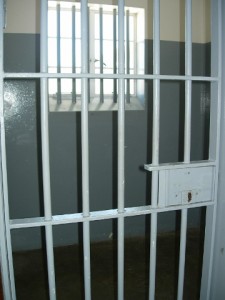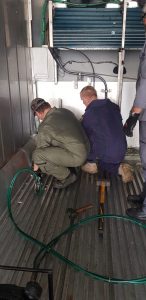Relaunch of women’s network and men for change
Programme Director
Deputy Minister of Police, Ms Sotyu
Deputy National Commissioners
Provincial and Divisional Commissioners
Senior management of the SAPS
Labour representatives and other stakeholders present
Delegates representing the SAPS Women’s Network and Men for Change
Members of the media
Ladies and gentlemen, good morning, dumelang, thobela.
Thank you for affording me the opportunity to address you today, it is indeed a privilege. This event forms part of our back-to-basics approach and is an integral part of reviewing and launching the SAPS’s programme of action for this financial year.
Deputy Minister, I add my voice to that of Lt Gen Mgwenya in welcoming you and thanking you for your continued support. You are indeed an inspiration.
Empowering women remains an integral part of development in South Africa. One cannot address the development of this nation without mentioning women. Women play such an important part in our growth and development that even the President of this country saw fit to raise women to the highest office in the country, namely the Presidency.
The mission of the Department of Women in the Presidency, is to accelerate socio-economic transformation to empower women and ensure their participation through monitoring, evaluating and influencing policy.
In spearheading transformation, the SAPS has decided to re-launch the Women’s Network and Men for Change, revamping and shaping its enhanced transformation imperative.
In transforming our country or our organisation men are also important. Men too form part of the much needed transformation within the service. They have to be part of this process to understand that the aim is not to take power away from them, but to highlight the power of our combined capacities and strength when we as men and women gather for a just and noble cause.
Ladies and gentlemen: I cannot in this given moment touch on everything the Women’s Network and the Men for Change have achieved. I will however highlight the significant gains of these visionaries.
The Women’s Network has played an important role in aligning itself with programmes for the elimination of violence against women and children.
The SAPS Women’s Network ensured that the sexual harassment policy was properly implemented and that the victims’ dignity is protected. They ensured the implementation of such policies in the Southern African Development Community, or the SADC region. The Women’s Network embraced the SA government’s responsibility of pioneering transformation and upholding human rights by us and our neighbouring states.
Ladies and gentlemen: we recognise and welcome our government’s efforts in accepting the necessary gender equality legislation to transform the status of women, not just in the SAPS, but also in our country and all its progressive institutions. South Africa remains a signatory and partner to all international organisations that commit to gender equality. This includes the following:
- The Convention on the Elimination of all Forms of Discrimination Against Women
- The UN Security Council Resolution 1325
- The UN General Assembly Resolution on Crime Prevention and Criminal Justice Measures to Eliminate Violence Against Women.
- The Millennium Development Goal No 3 Promote Gender and Equality and Empower Women.
Ladies and gentlemen, the SAPS’s strategies, policies, Standing Orders and National Instructions aim at personifying all facets of gender equality. It is the Women’s Network in partnership with Men for Change, as well as with other relevant stakeholders externally and within the SAPS, that should champion matters of gender equality; discrimination against women; training and development; promotion of women; sexual harassment and gender-based violence, thereby influencing the policies and strategic objectives of the SAPS.
It is also important to remind ourselves of the founding principles and strategic goals of the SAPS Women’s Network, namely:
- Commitment to empowerment and support for all women
- Contribution towards combating gender-based violence
- Participation in nation building and social responsibility programmes
- Providing a platform for addressing personal and professional issues that would be dealt with sensitively and confidentially.
Historical stereotypes and patriarchy led to identifying transformed men who were to act as agents of change to influence and address stereotypes and identified attitudes. Men For Change was therefore established in 2004 and played a critical role in dealing with issues that translate to crimes against humanity and which constitute gender-based violence, which in most cases involve firearms being used, femicide, alcohol and drug abuse. These programmes form part of the strategic priorities of the SAPS.
Men for Change was pioneered by Corporate Services. Men for Change looked beyond the masculinity of a man. It looked at behavioural change, establishing a culture of open men, ensuring that men found their voices and roles when it came to violence against women and children, necessitating men to start talking openly about their challenges and their roles in society, their shared visions and beliefs. The objectives of Men for Change spoke to:
- Aligning its activities with the strategic business plan of the service
- Provide support structures for male employees of the service
- Facilitate the career development of males through training programmes
- To collaborate with the Women’s Network in promoting gender equality within the workplace
- Serves as a motivational structure that increases awareness and contributes to changing attitudes and stereotypes on gender issues
It is the Men for Change that worked with the Odirile School for the handicapped, arranging material to assist challenged school children. It organised businesses like ABSA and Assupol to engage members on issues such as investments and the drawing up of wills while we have time.
Ladies and gentlemen, today presents an opportunity to recommit ourselves to the ideals of the Women’s Network and Men For Change. As we re-launch these two important vehicles of transformation, let us take stock of the road that has been travelled, our failures and challenges, and let us labour to transform the SAPS to enable every employee to realise their full potential. Let these ideals resonate in the National Development Plan and in our daily policing lives.
Going forward, we are weaker without each other. In hard work and commitment lies the success of the Women’s Network as well as the Men for Change. Joint targeted gender related programmes have to be developed. Programmes like “Take a boy child to work – Tour behind bars” needs to find meaning in our strategic objectives, together with the Take a Girl Child to Work campaign. Let’s reignite and establish strong internal and external networks, national and global networks. May these mirror the shared vision of the National Development Plan, aligned to our “Back to Basics” approach.
Thank you.










